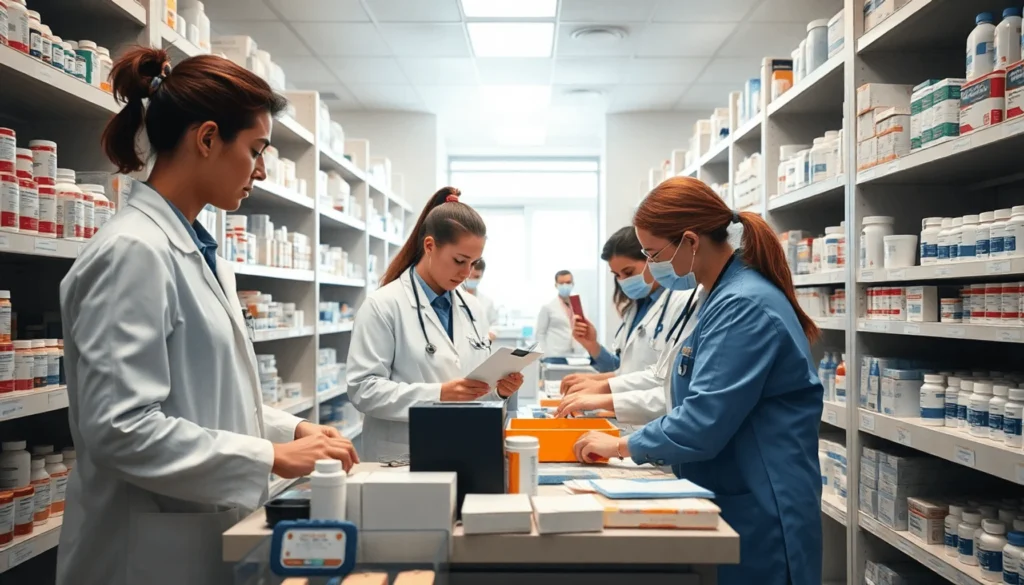
Pharmacy Technician Salary Guide 2025 | Average Pay & Trends
A career as a pharmacy technician offers a promising entry point into the healthcare sector. In 2023, pharmacy technicians earn a median annual salary of $40,300 ($19.37 per hour), making it an attractive option for those seeking stable employment without extensive educational requirements.
The salary landscape for pharmacy technicians spans from $32,720 to $57,130 annually, reflecting various factors such as:
- Geographic location
- Work setting (retail vs. hospital)
- Experience level
- Specialized certifications
- Shift differentials
Understanding these salary trends helps you make informed decisions about your career path. The pharmacy field continues to evolve, with technicians taking on expanded responsibilities as pharmacists focus more on patient care services.
When comparing salaries, it’s worth noting that pharmacists earn significantly more – typically $128,570 per year. This substantial difference reflects the additional education requirements and responsibilities. Yet, many pharmacy technicians use their experience as a stepping stone, either advancing within the field or pursuing further education to become licensed pharmacists.
The growing demand for healthcare services, particularly among aging populations, drives a positive job outlook. The Bureau of Labor Statistics projects a 6% growth rate in pharmacy technician positions through 2032, creating 44,900 new job openings annually.
Table of Contents
Pharmacy Technician Salary Overview

Pharmacy technicians are vital healthcare professionals who work closely with prescription medications under the guidance of pharmacists. Here are some of the tasks you’ll handle on a daily basis:
- Processing and filling prescriptions
- Managing inventory systems
- Handling insurance claims
- Maintaining patient records
- Collecting payments
- Coordinating with healthcare providers
Average Salary of Pharmacy Technicians
According to the Bureau of Labor Statistics (BLS), pharmacy technicians earn a median annual salary of $40,300, which translates to $19.37 per hour. The salary range typically falls between $32,720 and $57,130 annually, depending on factors such as experience and job responsibilities.
Salary Variations by Work Setting
The BLS data reveals distinct salary patterns based on work settings:
- Hospital pharmacies: $41,850
- Retail pharmacies: $38,740
- Mail-order facilities: $39,920
- Specialty pharmacies: $42,300
Impact of Professional Certifications on Salary
Professional certifications can significantly influence your earning potential as a pharmacy technician. The Ultimate Medical Academy (UMA) certification stands out as a valuable credential that often leads to:
- Higher starting salaries
- Increased job opportunities
- Faster career advancement
- Specialized role eligibility
Your earning potential increases with additional certifications:
- PTCB Certification: +$2,000 annual average
- Sterile Compounding Certification: +$3,500 annual average
- Chemotherapy Certification: +$4,000 annual average
Skills That Affect Your Market Value
Pharmacy technician salary is closely tied to the specific skills and qualifications you bring to the role, as these directly influence your market value:
- Pharmaceutical calculations
- Medical terminology
- Insurance processing
- Inventory management
- Patient communication
- Technology proficiency
These salary figures reflect the growing importance of pharmacy technicians in healthcare delivery systems. As experienced professionals with expertise and certifications command higher compensation packages, it highlights the value placed on their contributions to patient care and medication management.
If you’re considering a career as a pharmacy technician, you might want to explore how to become a pharmacy technician in Maryland through this comprehensive guide. Additionally, obtaining skills in areas like medical billing and coding can further enhance your employability and salary prospects in this field.
Factors Influencing Pharmacy Technician Salaries

Your salary potential as a pharmacy technician depends on several key factors that can significantly impact your earning power. Here’s what drives salary differences in this field:
1. Specialized Skills and Knowledge
- Proficiency in pharmaceutical calculations adds $2-4/hour to base pay
- Advanced medical terminology expertise increases earning potential by 5-10%
- Sterile compounding certification can boost wages by up to 15%
- Inventory management skills command higher compensation rates
2. Certification and Education
- PTCB certification holders earn 10-15% more than non-certified techs
- Advanced certifications in chemotherapy or nuclear pharmacy increase pay by 20%
- Continuing education credits demonstrate expertise worth $1-2/hour more
- Specialized training in automated dispensing systems adds value
3. Insurance and Administrative Expertise
- Insurance claims processing skills warrant higher wages
- Knowledge of multiple insurance platforms increases marketability
- Billing and reimbursement expertise commands premium pay
- Prior authorization experience adds $1-3/hour to base salary
4. Work Environment and Responsibilities
- Hospital settings typically offer 10-15% higher wages than retail
- Night shift differentials add 10-20% to base pay
- Leadership roles (lead tech, supervisor) increase earnings by 15-25%
- Specialty pharmacy experience commands higher compensation
5. Geographic Location
- Urban areas offer 15-30% higher salaries than rural locations
- Cost of living adjustments affect base pay rates
- State-specific regulations influence wage scales
- High-demand markets provide better compensation packages
6. Experience Level
- Entry-level positions start at base industry rates
- 3-5 years experience increases earnings by 20-25%
- 10+ years experience commands top-tier compensation
- Specialized facility experience adds premium value
Moreover, understanding the insurance regulations and compliance requirements can greatly enhance your administrative expertise, further influencing your salary potential.
Median Pay and Salary Ranges for Pharmacy Technicians
The median annual salary for pharmacy technicians in the United States stands at $40,300, translating to an hourly wage of $19.37. Your earning potential ranges from $32,720 to $57,130 per year, depending on various factors.
Top-Paying States for Pharmacy Technicians:
- California: $55,710
- Washington: $53,000
- Alaska: $49,810
- Oregon: $48,000
- Minnesota: $47,100
Metropolitan Areas with Highest Salaries:
- San Francisco-Oakland-Hayward, CA: $61,500
- San Jose-Sunnyvale-Santa Clara, CA: $60,300
- Seattle-Tacoma-Bellevue, WA: $57,000
- Sacramento-Roseville-Arden-Arcade, CA: $54,700
Salary Distribution by Work Setting:
- Hospital Pharmacies: $42,400
- Retail Chain Pharmacies: $38,900
- Independent Pharmacies: $37,800
- Mail-Order Pharmacies: $41,200
The salary landscape shows significant regional variations. States with higher costs of living, such as California and Washington, offer substantially higher wages compared to states like Alabama ($37,030) or Kentucky ($37,100).
Pharmacy technician salary tends to be significantly higher in urban areas compared to rural locations. Major metropolitan centers, especially in the Western United States, offer some of the most competitive wages in the field. Notably, pharmacy technicians in the San Francisco Bay Area can earn salaries up to 50% above the national median.
Your specific work environment impacts your earning potential. Hospital settings typically offer higher base pay rates compared to retail pharmacies. Night shifts, weekend work, and holiday coverage often come with pay differentials ranging from 10% to 15% above base rates.
The salary data reflects a growing demand for skilled pharmacy technicians across different healthcare settings. Your geographical location plays a crucial role in determining your earning potential, with coastal states and major metropolitan areas offering the most competitive compensation packages.
Job Outlook and Growth Opportunities for Pharmacy Technicians
Pharmacy technician salary prospects are supported by strong job growth in the field. According to the U.S. Bureau of Labor Statistics, employment for pharmacy technicians is expected to grow by 6% through 2032 — outpacing the average growth rate for all occupations. This trend is projected to generate around 44,900 job openings each year.

Several factors drive this positive job outlook:
- Aging Population: The growing elderly demographic requires more prescription medications
- Healthcare Expansion: Increased access to healthcare services and insurance coverage
- Pharmacist Role Evolution: Pharmacists taking on more patient care duties, creating additional tech responsibilities
- Retail Growth: New pharmacy locations in grocery stores and drugstore chains
The path to career advancement requires strategic preparation through certification and education. The Pharmacy Technician Certification Exam (PTCE) serves as a crucial stepping stone for career growth. This certification:
- Demonstrates professional competency
- Qualifies you for higher-paying positions
- Opens doors to specialized roles
- Increases job security
Advanced Career Paths for Certified Pharmacy Technicians:
- Specialty Pharmacy Operations
- Inventory Management Specialist
- Lead Pharmacy Technician
- Pharmacy Purchasing Coordinator
- Sterile Compounding Specialist
Many employers offer tuition reimbursement and certification preparation programs. Hospital systems often provide internal advancement tracks for pharmacy technicians who pursue additional certifications and specialized training.
The demand for specialized skills creates opportunities in:
- Nuclear pharmacy
- Chemotherapy medication preparation
- Long-term care facilities
- Mail-order pharmacy operations
- Healthcare technology systems
Pharmacy technician salary tends to be higher for those in specialized roles, which also come with greater job stability. With steady industry growth and a wide range of career opportunities, pharmacy technology stands out as a promising long-term option for healthcare professionals aiming for advancement and security.
State-Specific Salary Data for Pharmacy Technicians in the U.S.
Pharmacy technician salaries vary significantly across different states, reflecting local economic conditions, cost of living, and healthcare market demands. Here’s a detailed breakdown of salary variations across the United States:
Highest-Paying States
- California: $55,710
- Washington: $53,000
- Alaska: $49,810
- Minnesota: $47,100
- Oregon: $48,000
Lower-Paying States
- Alabama: $37,030
- Kentucky: $37,100
- Louisiana: $37,670
- Mississippi: $37,630
- West Virginia: $37,000
Several key factors create these state-by-state salary discrepancies:
Cost of Living Factors
- Housing expenses
- Transportation costs
- Healthcare costs
- Local tax rates
Market Demand Factors
- Population density
- Number of healthcare facilities
- Rural vs urban settings
- Competition for skilled workers
Metropolitan Areas with Premium Pay Rates
- San Francisco-Oakland-Hayward, CA: $61,500
- San Jose-Sunnyvale-Santa Clara, CA: $60,300
- Seattle-Tacoma-Bellevue, WA: $57,000
- Sacramento-Roseville-Arden-Arcade, CA: $54,700
Regional Economic Factors
- State healthcare budgets
- Local insurance reimbursement rates
- Presence of large healthcare systems
- State-specific pharmacy regulations
The salary gap between states can exceed $18,000 annually, making location a crucial factor in earning potential. Urban areas typically offer higher wages than rural locations, even within the same state. State-specific certification requirements also influence salary levels, with stricter regulations often correlating with higher pay rates.
Career Advancement and Higher Earning Potential as a Pharmacy Technician
Pharmacy technicians can significantly boost their earning potential through strategic career development. The path to higher wages combines essential skill acquisition with targeted educational advancement.
Key Skills for Career Growth
- Advanced pharmaceutical calculations
- Sterile compounding expertise
- Leadership and team management abilities
- Inventory management systems proficiency
- Insurance and billing specialization
Educational Pathways
- Specialized certifications in IV preparation
- Advanced pharmacy technician programs
- Management training courses
- Healthcare administration certificates
- Continuing education units (CEUs)
Career Advancement Routes
- Lead Pharmacy Technician: Supervise other technicians, earning $45,000-$55,000 annually
- Specialty Pharmacy Tech: Focus on oncology or nuclear pharmacy, earning $50,000-$60,000
- Pharmacy Buyer: Manage inventory and purchasing, earning $48,000-$58,000
- Pharmacy Operations Manager: Oversee daily operations, earning $55,000-$70,000
Skill-Based Pay Increases
Working in specialized areas can boost your base salary:
- Compounding: +$2-4/hour
- IV preparation: +$3-5/hour
- Chemotherapy preparation: +$4-6/hour
- Night shift differential: +$2-3/hour
Advanced Certifications Impact
Earning advanced certifications directly influences salary potential:
- PTCB Advanced Certification: 10-15% salary increase
- Sterile Products Certification: 8-12% salary increase
- Hazardous Drug Management: 7-10% salary increase
Pharmacy technicians who combine multiple advanced certifications with specialized skills create powerful leverage for salary negotiations. Many employers offer tuition reimbursement and certification support, making educational advancement financially accessible.
Comparison with Other Healthcare Jobs: Pharmacy Technicians vs. Entry-Level Healthcare Professions
Understanding how pharmacy technician salary compare to other entry-level healthcare positions can help you make informed career decisions. Here’s a detailed comparison of annual median salaries in related healthcare roles:
Entry-Level Healthcare Salary Comparison:
- Dental Assistants: $47,400
- Phlebotomists: $43,100
- Medical Assistants: $42,000
- Pharmacy Technicians: $40,300
- Nursing Assistants: $38,100
The salary differences reflect varying responsibilities and required qualifications. Dental assistants top the list due to specialized skills in dental procedures and x-ray operations. Phlebotomists earn higher wages because of their expertise in blood collection and laboratory procedures.
Key Advantages of Pharmacy Technician Roles:
- Flexible scheduling options with shift differentials
- Advancement opportunities within pharmacy settings
- Lower educational barrier to entry
- Stable job market with consistent growth
- Potential for specialized certifications
While the base salary for pharmacy technicians sits in the middle range, you can increase your earning potential through:
Specialized Work Settings:
- Hospital pharmacies: +$2,000-4,000 annual premium
- Nuclear pharmacy: +$5,000-8,000 annual premium
- Compounding facilities: +$3,000-6,000 annual premium
Location-Based Opportunities:
- California technicians: $55,710
- Washington state: $53,000
- Alaska: $49,810
The pharmacy technician field offers unique benefits compared to other entry-level healthcare positions. Your ability to work in diverse settings, from retail to specialized pharmacies, creates multiple paths for salary growth. The role’s lower educational requirements allow you to enter the healthcare field quickly while maintaining opportunities for advancement.
Strategies to Increase Your Salary as a Pharmacy Technician
Ready to boost your earning potential as a pharmacy technician? Here are proven strategies to increase your salary:
1. Pursue Advanced Certifications
- Earn PTCB (Pharmacy Technician Certification Board) certification
- Complete specialized certifications in compounding
- Get certified in sterile preparation
- Obtain IV certification for hospital settings
2. Develop High-Demand Skills
- Master pharmaceutical calculations
- Learn advanced inventory management systems
- Become proficient in multiple pharmacy software platforms
- Gain expertise in insurance claims processing
- Build strong customer service abilities
3. Strategic Career Moves
- Consider hospital pharmacy positions (typically higher paying than retail)
- Work night shifts or weekends for differential pay
- Relocate to higher-paying metropolitan areas
- Apply to specialized pharmacy settings like nuclear or compounding facilities
4. Education and Training
- Complete an accredited pharmacy technician program
- Take continuing education courses
- Attend professional development workshops
- Learn about emerging pharmacy technologies
5. Workplace Excellence
- Take on leadership responsibilities
- Train new pharmacy technicians
- Volunteer for additional projects
- Build strong relationships with pharmacists and management
- Document your achievements and contributions
6. Negotiation Tactics
- Research salary data for your area
- Track your performance metrics
- Document additional certifications and training
- Present your value during performance reviews
- Request regular salary reviews
7. Specialization Options
Focus on specific areas of pharmacy practice to enhance your expertise and marketability:
- Focus on oncology pharmacy
- Pursue nuclear pharmacy certification
- Specialize in pediatric pharmacy
- Learn long-term care pharmacy operations
These strategies can significantly impact your earning potential. Many pharmacy technicians who implement multiple approaches see salary increases of 15-25% within their first few years.
Conclusion
The pharmacy technician career path offers diverse opportunities across different work environments, each with distinct wage structures. Hospital-based positions typically offer higher salaries, with median annual wages reaching $45,000, while retail pharmacy settings start at around $38,000. Specialized settings like compounding pharmacies or long-term care facilities often provide competitive compensation packages.
Pharmacy technician salary in 2025 is influenced by several important factors that determine your overall earning potential:
- Work Environment: Hospital settings vs retail pharmacies
- Geographic Location: Urban areas generally offer higher wages
- Shift Differentials: Night shifts and weekend work can boost earnings
- Specialization: Compounding, chemotherapy, or nuclear pharmacy expertise
Pharmacy technician salary continues to reflect the strong demand and stability of this career path through 2025. As the healthcare sector grows to meet the needs of an aging population, skilled pharmacy technicians are increasingly sought after. In addition to a competitive salary, the role offers advancement opportunities and flexible work settings, making it an appealing option for those pursuing a steady and rewarding healthcare career.
The path to success lies in continuous learning, acquiring specialized certifications, and gaining experience in different pharmacy settings. Your commitment to professional development directly impacts your earning potential and career satisfaction in this rewarding healthcare field.
FAQs (Frequently Asked Questions)
What is the average salary of a pharmacy technician according to the Bureau of Labor Statistics?
Pharmacy technician salary figures from the Bureau of Labor Statistics reveal that median earnings can differ significantly depending on experience level and geographic location. Analyzing this data allows pharmacy technicians to better understand their potential income.
How do certifications like UMA impact a pharmacy technician’s salary?
Obtaining certifications like UMA significantly boosts a pharmacy technician’s credentials, often resulting in a higher pharmacy technician salary and improved job prospects by proving expertise in key areas such as pharmaceutical calculations and medical terminology.
What factors influence the salary differences among pharmacy technicians across different U.S. states?
Pharmacy technician salary varies across states due to differences in the cost of living, the demand for technicians, state healthcare regulations, and access to advanced training or certifications, all of which impact pay rates.
How does the salary of a pharmacy technician compare to other entry-level healthcare professions?
Pharmacy technician salary tends to be competitive compared to other entry-level positions in the healthcare field. Due to their specialized responsibilities—such as managing prescription medications and processing insurance claims—pharmacy technicians often enjoy higher earning potential than many roles at a similar level.
What education pathways can help a pharmacy technician increase their earning potential?
Enhancing your skills through advanced certifications, specialized training, and expertise in areas such as pharmaceutical calculations and insurance claims can significantly boost your pharmacy technician salary and open doors to greater career opportunities.
How does working in different settings like hospitals versus retail pharmacies affect a pharmacy technician’s salary?
Pharmacy technician salary often varies depending on the work environment, with hospital settings generally offering higher pay than retail pharmacies. This difference is largely influenced by the level of responsibility, required skill sets, and demand unique to each setting.
